 Petzlover
Petzlover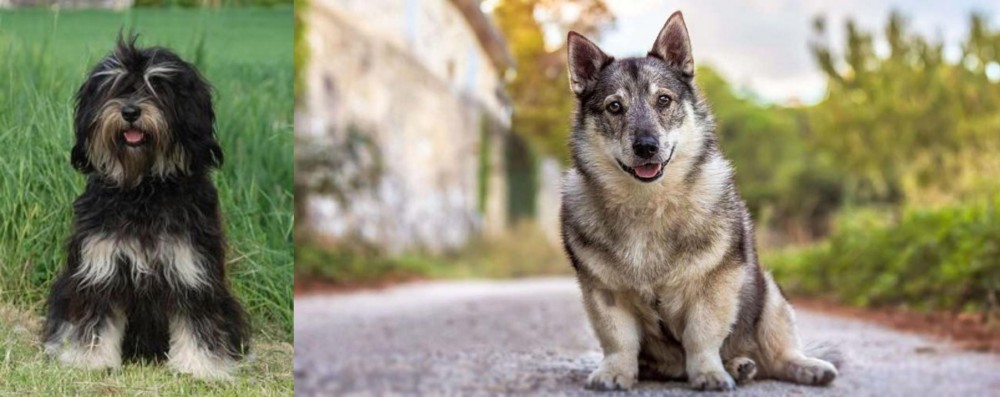 Cao da Serra de Aires is originated from Portugal but Swedish Vallhund is originated from Sweden. Cao da Serra de Aires may grow 21 cm / 9 inches higher than Swedish Vallhund. Cao da Serra de Aires may weigh 13 kg / 29 pounds more than Swedish Vallhund. Both Cao da Serra de Aires and Swedish Vallhund has almost same life span. Cao da Serra de Aires may have less litter size than Swedish Vallhund. Both Cao da Serra de Aires and Swedish Vallhund requires Moderate Maintenance.
Cao da Serra de Aires is originated from Portugal but Swedish Vallhund is originated from Sweden. Cao da Serra de Aires may grow 21 cm / 9 inches higher than Swedish Vallhund. Cao da Serra de Aires may weigh 13 kg / 29 pounds more than Swedish Vallhund. Both Cao da Serra de Aires and Swedish Vallhund has almost same life span. Cao da Serra de Aires may have less litter size than Swedish Vallhund. Both Cao da Serra de Aires and Swedish Vallhund requires Moderate Maintenance.
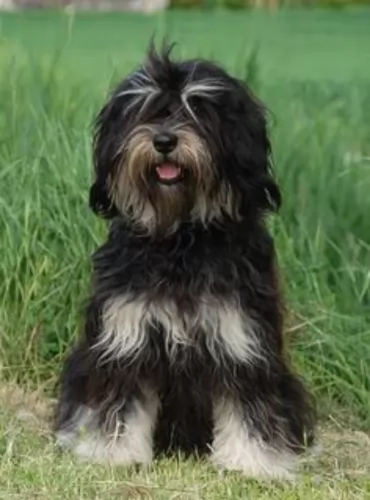 Ancestors of the Cao da Sera de Aires were used for herding livestock in the Serra de Aires and Alentejo, Portugal. This herding dog is native to Portugal and throughout the 20th Century he was kept as a working dog.
Ancestors of the Cao da Sera de Aires were used for herding livestock in the Serra de Aires and Alentejo, Portugal. This herding dog is native to Portugal and throughout the 20th Century he was kept as a working dog.
Known also as the Portuguese Sheepdog, Portuguese Shepherd Dog or Serra de Aires Mountain Dog, there are some questions surrounding the breed's ancestry as there are few records of dogs before 1900. The dog is thought to be related to the Pyrenean and Catalan Sheepdogs and that it has descended from Briards which were imported into Portugal and crossed with the Pyrenean Sheepdog.
The Cão da Serra de Aires breed standard was accepted by the Portuguese Kennel Club, and the breed was recognized internationally in 1996. The dog was also recognized by the United Kennel Club in the Herding Group in 2006.
 Known also as the Västgötaspets or Swedish cow dog, the Valhund hails from Sweden. It’s a herding dog, and was always a farm dog in that country.
Known also as the Västgötaspets or Swedish cow dog, the Valhund hails from Sweden. It’s a herding dog, and was always a farm dog in that country.
It was in 1943 that the dog was first recognized as a breed by the Swedish Kennel Club. Only later, in 1996, did the American Kennel Club start registering the breed.
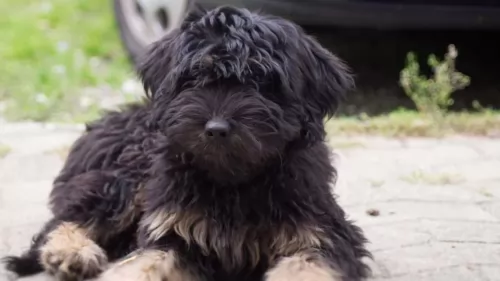 The beautiful Cão da Serra de Aires is a medium-sized dog. He stands at 45 to 55 cm at the withers and weighs about 17 to 27 kg. He is recognizable by the long, shaggy, single-layer coat, of straight or slightly wavy hair. Don’t be deceived by the coat as below, the dog has a muscular, athletic body.
The beautiful Cão da Serra de Aires is a medium-sized dog. He stands at 45 to 55 cm at the withers and weighs about 17 to 27 kg. He is recognizable by the long, shaggy, single-layer coat, of straight or slightly wavy hair. Don’t be deceived by the coat as below, the dog has a muscular, athletic body.
The coat comes in different shades such as fawn, gray, yellow and black. The dog has a long tail which is held straight out or down and he has medium-length, floppy ears. You’ve got to look hard, as the facial features of the dog are hidden by its shaggy coat. He has a lot of facial hair that sometimes you have to wonder if he can see out of his eyes.
The Cao da Serra de Aires is a wonderful canine companion and is devoted and loyal, forming strong bonds with their human family. He is a playful, amicable dog and gets on well with children in the home as well as with other pets.
He is intelligent and trainable, and when properly trained and socialized,he becomes an even nicer pet to have around and is obedient to his master’s voice. He is territorial, strong willed and dominant and makes a good watchdog too.
 Looking much like a cross between a Corgi and the German Shepherd, the Swedish Valhund is a medium sized dog that stands between 30 and 34cm in height and weighs between 9 and 14kg.
Looking much like a cross between a Corgi and the German Shepherd, the Swedish Valhund is a medium sized dog that stands between 30 and 34cm in height and weighs between 9 and 14kg.
His medium length weather-resistant coat is available in wolf like shades – cream, grey, brown etc. The tail can be long or bobbed and the medium sized ears are held erect.
Intelligent, confident, independent, alert, playful and active, your Swedish Valhund promises to make a good family pet.
You'll need to be an active, outdoor type of family though, as he isn’t a couch potato type of dog, snoozing in front of the TV.
He wants to be up and about going on long walks or playing ball games that give him a good run. If he gets his fair share of exercise he can adapt to life in the city or the countryside.
He just loves his human family and wants to be constantly with them. He won’t do well if you just keep him locked outside away from everyone. He is social, alert innovative and entertaining as well as being a good guard dog.
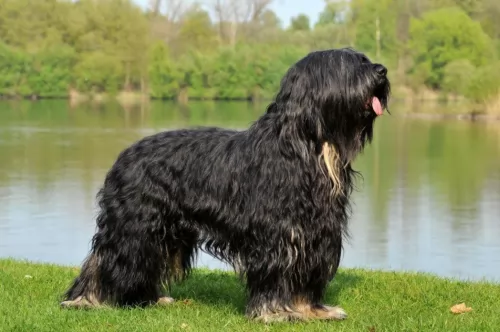 The Cão da Serra de Aires is such a loyal dog to his human family that he makes a splendid pet. He is active, having worked historically at herding and guarding.
The Cão da Serra de Aires is such a loyal dog to his human family that he makes a splendid pet. He is active, having worked historically at herding and guarding.
Socialization and obedience training ensure that he becomes an exceptional pet and he has a host of positive attributes to his name – he is intelligent, energetic, loyal and loving. He may have been used long ago to guard livestock, but today he is selected as a pet specifically for his excellent companionship and for his protective nature.
 Your Swedish Valhund is such a confident, independent dog and he promises to be a loving, faithful pet. He's also alert and will let you know if strangers are approaching his property.
Your Swedish Valhund is such a confident, independent dog and he promises to be a loving, faithful pet. He's also alert and will let you know if strangers are approaching his property.
He is a calm, easy going pet and is capable of adapting to quiet or noisy homes. He may be quite a strange looking dog, but he's got a whole lot of loving to give.
 As with most dogs that are looked after well, their health can be good. The Cao da Serra de Aires isn’t likely to keep you at the vet often. Just like with any good dog, there are some health disorders that can benefit you to know about.
As with most dogs that are looked after well, their health can be good. The Cao da Serra de Aires isn’t likely to keep you at the vet often. Just like with any good dog, there are some health disorders that can benefit you to know about.
Being forewarned , you can get your pet to the vet quickly before the illness gets out of hand.
There are some pet owners who want to have their pets tested by the Orthopedic Foundation for Animals as well as the Canine Eye Registration Foundation to rule out health defects such as hip dysplasia and cataracts before they manifest themselves in their pets. This is of particular importance to breeders so as to prevent the parent dogs passing bad genetic conditions to the puppies.
This is a common skeletal disease where the dog’s hip joints don’t develop properly. It can be terribly painful for your pet to get around. It’s a genetic condition and while it is more prevalent in big dogs, any breeds are susceptible.
Your dog will battle along with painful joints and sometimes his hind-end will be lame. You’ll notice that once lying down, he battles to get up again. Fortunately vets are well acquainted with this ailment and they have different options to treat and manage it.
Cataracts in your dog come about from a disease process which affects the lens of the eye. The eye loses its transparency and impairs vision. There are some instances where cataracts can cause blindness. You’ll see a whitish gray area in your pets eye. The most common cause of cataracts is genetics. Get your pet to the vet who will do certain tests to evaluate the eyes and make a recommendation.
 Capable of living a long, healthy life, the Swedish Valhund isn’t likely to fall victim to some of the many dog illnesses there are, and yet it is wise to be alert to some of them that he could get.
Capable of living a long, healthy life, the Swedish Valhund isn’t likely to fall victim to some of the many dog illnesses there are, and yet it is wise to be alert to some of them that he could get.
One of these is an hereditary eye disease known as retinopathy. Its where there is degeneration of the retinal photoreceptor cells. This eye disease can lead to blindness.
You need to be careful with this pet of yours, because with his long back and short legs he can so easily hurt his back if he leaps off a bed or high chair.
Whenever you pick this dog up, always support his legs and back. Don’t pick them up without supporting both the front legs and the rear end.
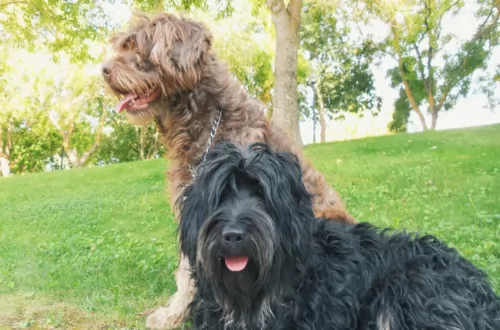 As a working dog used to long hours of action, the Cao da Serra de Aires will need lots of activity. He’ll need you taking him for long walks and playing ball games with him. He can become frustrated and destructive when left without any physical stimulation.
As a working dog used to long hours of action, the Cao da Serra de Aires will need lots of activity. He’ll need you taking him for long walks and playing ball games with him. He can become frustrated and destructive when left without any physical stimulation.
The Cao da Serra de Aires may have long hair but he isn’t high maintenance. He won’t require professional grooming, but will require a good brush a least twice a week. This is because the long coat can tangle.
To keep him looking his best, you’ll want to be trimming the hair around his paws. Another important grooming task is checking his ears and cleaning them. You have to be careful about cleaning your pet ears if you don’t know how, as it could damage the ears. Your vet can always advise you on how this is done.
 Try and feed your Swedish Valhund two meals a day instead of just one, so that he doesn’t gobble down his food too quickly.
Try and feed your Swedish Valhund two meals a day instead of just one, so that he doesn’t gobble down his food too quickly.
Your dog can be prone to obesity, so you have to be careful with the way you feed him. Overfeeding a dog packs on extra weight and this puts strain on the joints.
Apart from the dry kibble that you feed him, try to include some tasty, nutritious homemade food such as boiled chicken, brown rice or pasta, sweet potatoes, carrots and spinach.
This can all be chopped up and added to his dry kibble. Some raw meat added to the diet can only be to his benefit. Remember to always ensure a bowl of fresh, cool water is available.
Give his thick coat a brush twice a week to remove dead hair. Brushing also stimulates the sebaceous glands that produces oil which gives the coat is sheen.
Trim his nails because left long, they can hook onto things and rip the skin open.
Check inside the ears too for redness which could mean an ear infection.You get dog wipes that you can wipe the ear out with. There are always professional dog groomers who can do these chores for you if you don't want to.
See that his vaccines are up to date and that if he shows signs of illness, you get him to the vet.